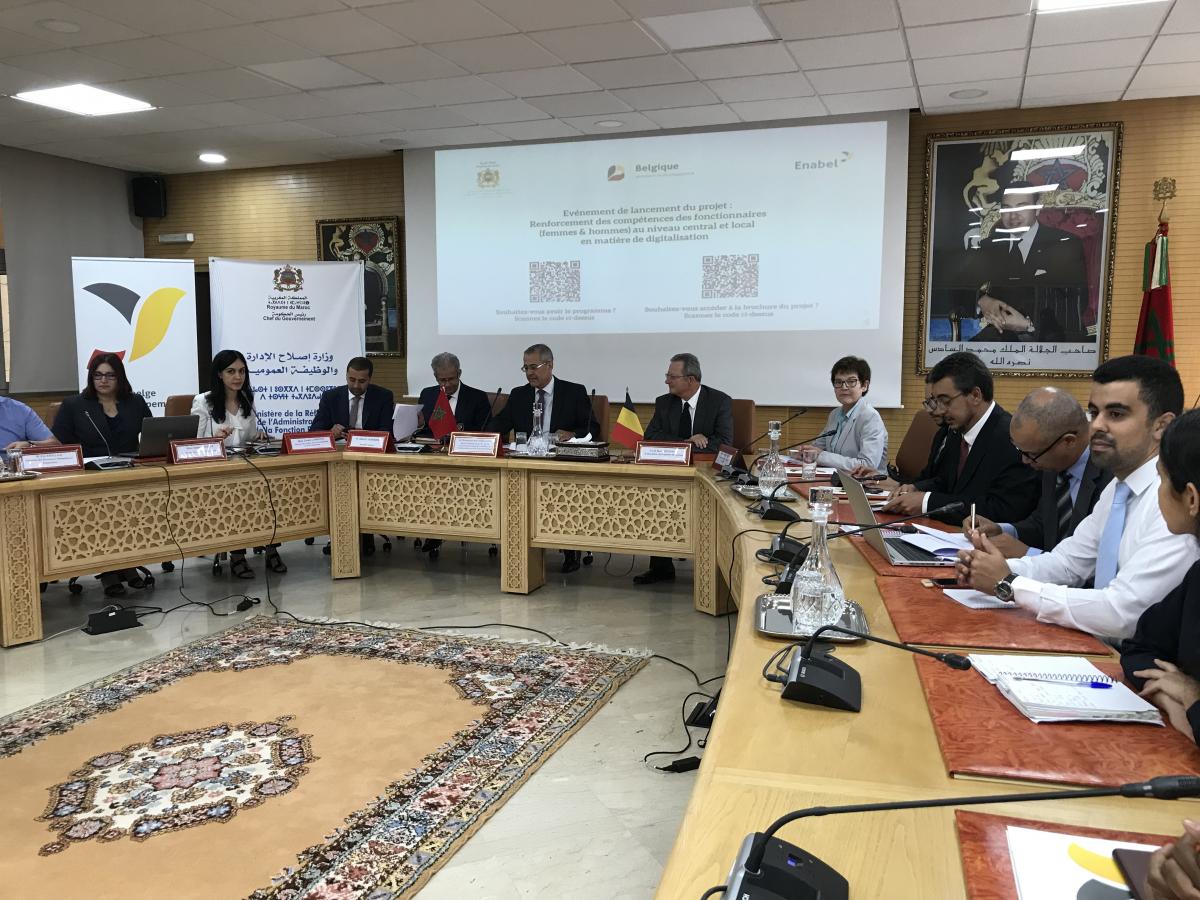Search
Viewing 2325 to 2340 of 3122 news
-
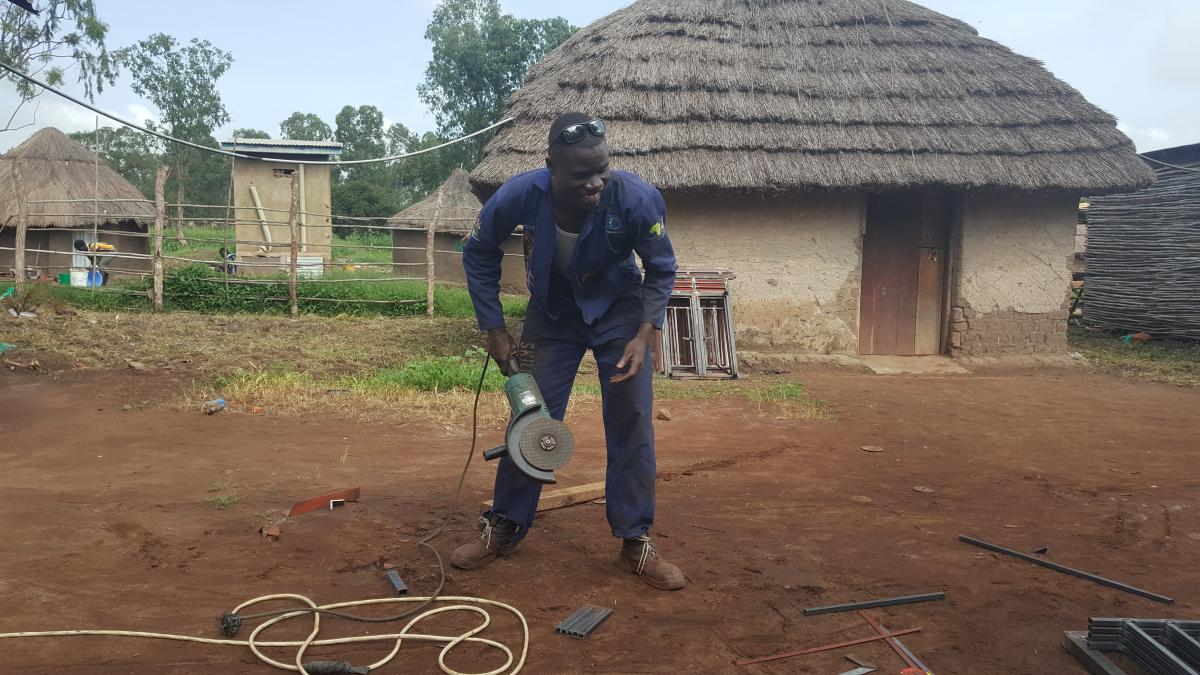
Meet Eyalu a young man who acquired skills in metal fabrication and supports his siblings and plans to employ youth.
Ibrahim OGARAM | 01/08/2019
When he completed senior four, Michael Eyalu Ugandan National,e had no fees to continue with formal studies. One day though his connections, Eyalu learnt of none formal training in metal fabrication supported by European Union Emergency Trust fund in Adjumani. He applied and was short listed for the course. European Union emergency fund supports host communities and refugees in northern Uganda acquire skills and improve livelihood. Enabel, Belgium Development agency supports skills development for refugees and host communities in Northern Uganda. Eyalu engaged in rigorously training and after six months, he was attached to apprenticeship in a local workshop in Adjumani. “It was here that we learnt the practical requirements of metal fabrication,” Eyalu says. According to the workshop Manager Silver, many young boys from different backgrounds come for industrial training and leave within a short time. Michael persisted and stayed. “He could come over the weekends. And when the industrial training ended, he continued to volunteer with us,” Silver said. After the industrial training, Eyalu was retained as metal welder. Here, Eyalu sharpened his skills and produced doors and windows. In a day, Eyalu makes four doors. He is paid UGX 15,000 per door. ‘When there is work, I am able to make good money,” Eyalu says. At the workshop, Eyalu is respected by fellow works, who describe him as dedicated worker. At the moment, Eyalu uses his daily income to sustain himself at Adjumani but also pay schools fees for his siblings in primary and secondary schools. He has six siblings. Eyalu plans to offer mentorship for incoming learners. ‘I know, they will come here. I will support them,” he says. With his new skills, Eyalu has plans to open a workshop. He was offered start up kits. “Once I open my workshop, I will train them and offer them jobs,” Eyalu says.
-
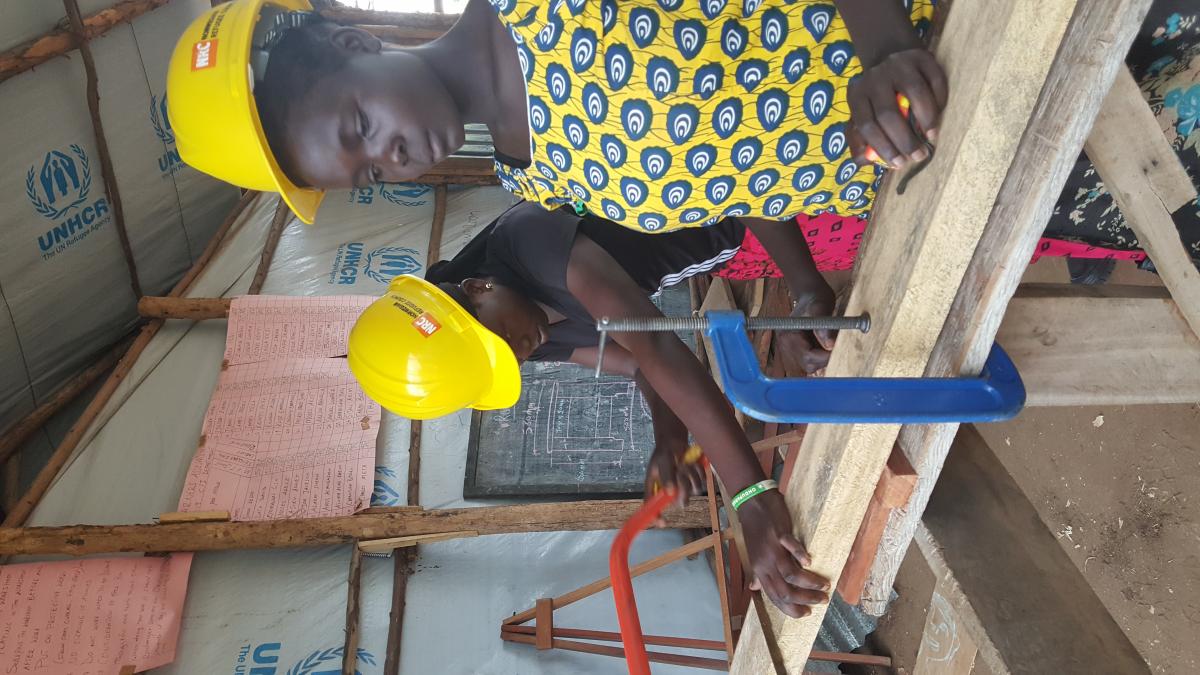
Face to face with the carpentry girls at the world’s largest refugee camp
Ibrahim OGARAM | 01/08/2019
In the cold afternoon at the world’s largest refugee camp, two girls enter into a carpentry workshop. Three years ago, none of them knew how to even cut timber. Under the watchful eye of Ugandan instructors, the young girls were determined to enter into a field commonly reserved for men. When it came to cutting timber, they also did it. They put on helmets and boots. After three months of intensive training, they are able to show their products including chairs, stools and tables. They were determined. This is Sarah. She is 18 year old Ugandan national. And that is Keji. She is a 19 year old south Sudanese refugee. Keji fled the war in South Sudan and took refuge in Bidi Bidi. At their workshop, they work as a team. When I arrived in their workshop in the afternoon, the young ladies were at work. Keji was picking timber. Sarah was sharpening the tools. They discussed amongst themselves like doctors preparing for delicate heart surgery. Then Sarah picks the timber and places it on the table. Keji picks a tape measure. She measures the timber. She marks it. Maybe about two feet. Then Sarah picks a sow. She places the sow exactly on the mark and begins to it cut away. The timber splits into two. Keji picks the piece that falls on ground. Places it at angle looks at it like a Navy sniper Seal taking aim at a target. She picks a sow and begins to cut at an angle. Done! She looks at it again. Then, she adjusts her helmet. Sweat drops on her face. She wipes the sweat with the back of her hand. She looks at me. I smile. She smiles and continues her work. The afternoon cloud covering Bidi bidi refugee camp roars. The sky threatens to give way. I request permission to enter inside the workshop. Sarah nods. I squeeze myself on the corner. I ask Keji if I can take a few photos. She nods and continues to polish her timber. Maybe after ten minutes, she has completed polishing the timber. It’s ready. They are determined to show me how they can make a table. I become impatient and tell them, its okay now. I have seen it. Still not convinced, Keji goes inside some room. She returns with two stools and a table. She smiles at me. While speaking in Arabic, she confidently tells me how she made the table and stools. I tease her that it can’t be true. She challenges me to wait and watch her make another stool. Now, I have spent about maybe two hours interacting and watching these young girls. My conversations have slowed their work. I tell them of some high level meeting that, I am to attend in the big city. They smile and ask no questions. Today, they were able to cut and prepare timber for their next table and show me the product. They tell me, carpentry is not a difficult job and that it’s not only for men. When I ask them, what they want. None of them mentions the obvious things like, I want you to give me money etc. Keji wants to return to South Sudan and in her words to become a ‘roofer’ And Sarah? She wants to open her workshop. Now, it’s getting dark. The young ladies escort me out. I jump into my big car. Sarah and Keji return to their workshop. Maybe, I will meet Keji when she is a minister of technology in south Sudan, while Sarah is the vice president of Uganda. I don’t know. But right now, I ask John my driver to press the accelerator and drive me out of Bidi Bidi. We head towards Kampala.
-

Skills training for better livelihood
William YEKA | 01/08/2019
Sylvia Lochoro was forced to drop out of school in senior three after becoming pregnant. Abandoned by the man who impregnated her and ridiculed by family and friends, life became very hard for Lochoro especially after giving birth, as she needed money to cater for herself and baby.
-
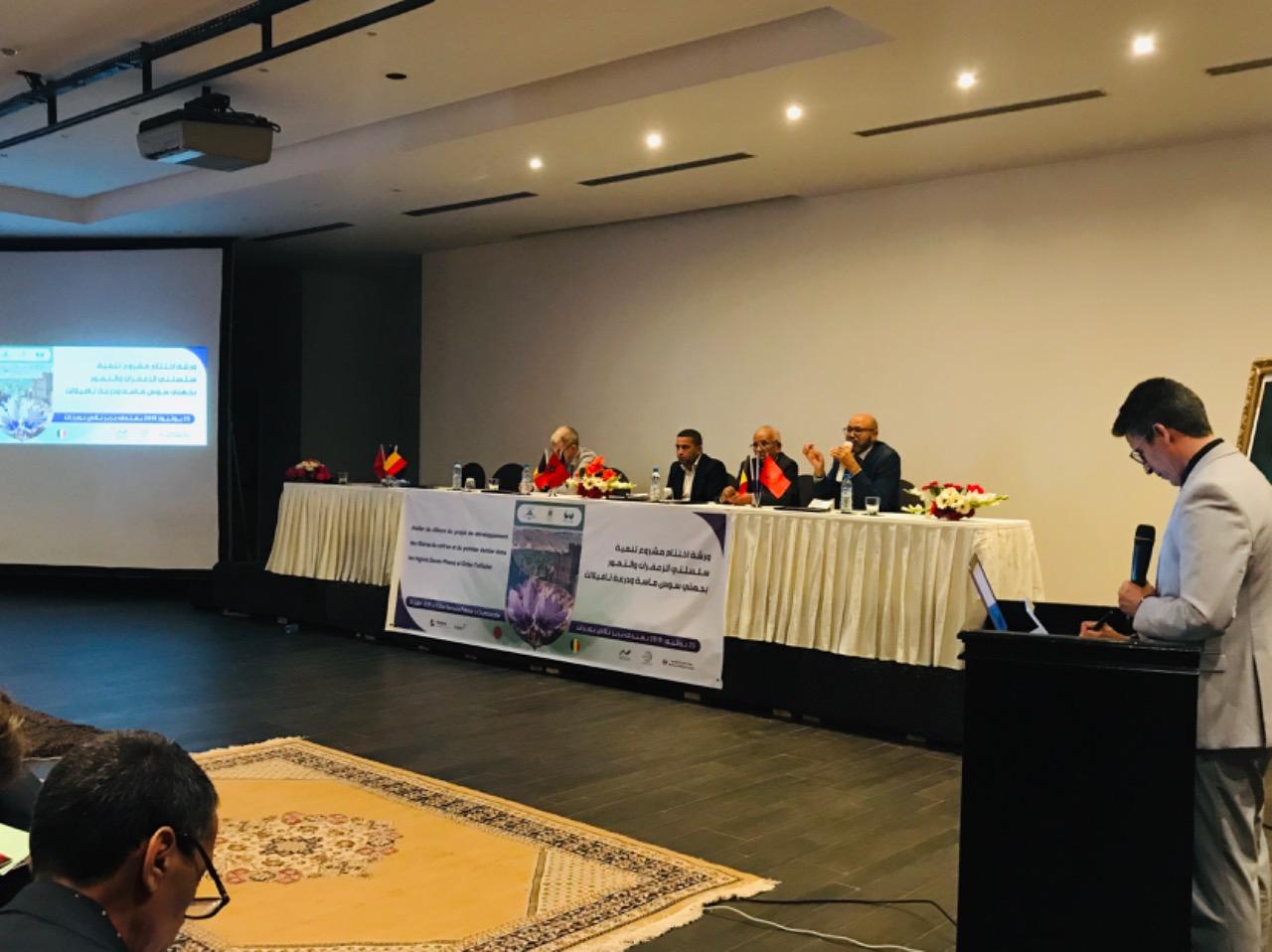
Atelier de clôture du projet
Meriem HILALI | 29/07/2019
Le Projet de Développement des Filières du Safran et du palmier Dattier dans les régions Souss-Massa et Drâa-Tafilalet a organisé le jeudi 25 juillet 2019 son atelier de clôture en présence de S.E Monsieur l'Ambassadeur du Royaume de Belgique au Maroc, des parties prenantes et de nos partenaires MAPMDREF, ORMVAO, ONCA, ADA et l'ONSSA Le projet s’inscrit de manière intégrante dans le Pilier II du Plan Maroc Vert, qui concerne l’agriculture solidaire. En effet, au sein des zones de Taliouine et Taznakht, le safran représente une source de revenus importante pour plus de 3.000 familles. Dans les oasis marocaines, le palmier dattier contribue aux revenus agricoles de plus d’un million de personnes. Dans les deux filières, l’enjeu se situe non seulement au niveau du développement économique, mais aussi au niveau de la gestion durable des ressources naturelles du sud marocain.
-
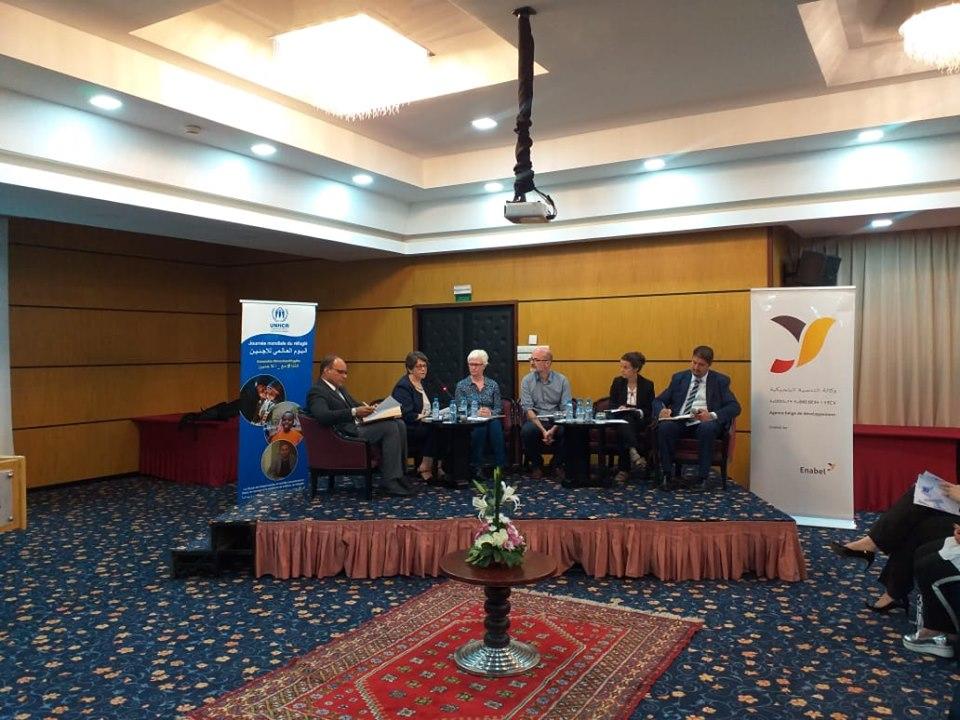
Célébration de la Journée Mondiale du Réfugié
Meriem HILALI | 23/07/2019
A l’occasion de la Journée Mondiale du Réfugié, -célébrée le 20 juin de chaque année-, le Ministère Délégué Chargé des MRE et des Affaires de la Migration et le Haut-Commissariat des Nations Unies pour les Réfugiés au Maroc avec l’appui de l’Agence belge de développement, organisent un atelier de réflexion sur l’auto-emploi des femmes réfugiées et ce, le 19 juin 2019 à Casablanca, pour débattre sur les dispositifs d’accompagnement existants pour l’auto-emploi des femmes réfugiées et du rôle des acteurs clés afin d’identifier les mesures concrètes pour une intégration économique réussie.Le projet belgo-marocain d’appui à la mise en œuvre de la Stratégie Nationale d’Immigration et d’Asile vise à améliorer l’employabilité des personnes migrantes et réfugiées au Maroc.
-
Le Kick off du projet
Meriem HILALI | 23/07/2019
Lancement officiel du Projet Renforcement des compétences des fonctionnaires au niveau central et local en matière de Digitalisation, le jeudi 11 juillet 2019 en présence de Monsieur le Ministre de la réforme administrative et de la fonction publique et Son Excellence Monsieur l’Ambassadeur du Royaume de Belgique au Maroc et plusieurs de nos partenaires.L’intervention est centrée sur l’impulsion d’un processus de changement au sein des administrations publiques ayant pour finalité que les compétences des fonctionnaires (F&H) soient renforcées pour une gestion plus efficace et efficiente du service public.L’objectif est de centrer l’appui à la réforme de l’administration publique sur la transformation digitale au niveau des partenaires de mise en œuvre de l’ensemble du programme de coopération bilatérale.
-
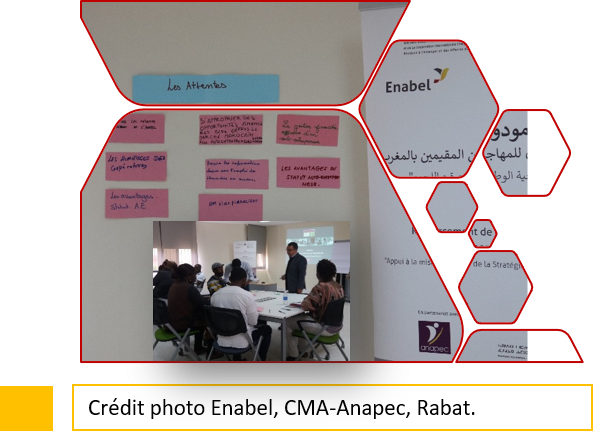
L’auto-emploi comme levier d’intégration des personnes migrantes au Maroc.
Saïd SAHLI | 19/07/2019
L’accès à une activité économique est essentiel pour faciliter l’intégration sociale et culturelle des personnes migrantes. Cela est l’hypothèse majeure du Projet Amuddu : Appui à la mise en œuvre de la Stratégie Nationale d’Immigration et d’Asile. « La réussite du projet est tributaire de l'inclusion socio-économique des personnes migrantes et de la consécration d'un modèle d'intégration d'avenir », assure M. Rachid Daghay, responsable du Centre multiservices pour les jeunes entrepreneurs de l'Agence nationale de promotion de l'emploi et des compétences (ANAPEC) au quartier d’Akkari à Rabat et partenaire de l’intervention. Dans cet esprit, plusieurs ateliers d’information et d’orientation sur les dispositifs d’accompagnement à l’emploi et à l’auto-emploi sont organisés auprès de la population migrante en collaboration avec le service public d’emploi (ANAPEC) et l’ONG Soleterre.Les difficultés pour accéder au marché de l’emploi, ainsi qu’à l’information pertinente sur les opportunités économiques et les possibilités d’accompagnement disponibles sont, parmi d’autres, des facteurs nuisant à l’intégration économique des ressortissants des pays tiers au Maroc. Afin de combler ces défis, le Projet Amuddu et ses partenaires organisent des séances d’information permettant aux personnes migrantes de connaitre les services d’orientation et d’accompagnement vers le marché de l’emploi ou l’auto-emploi offerts par le service public d’emploi. Ces ateliers sont également l’occasion de s’inscrire dans le système d’information de l’ANAPEC afin de pouvoir bénéficier de ses différents services. Vu les défis présents au niveau du marché de l’emploi marocain, une grande partie des participants aux ateliers s’intéressent notamment à l’option de lancer leur propre business. Encadrées par les conseillers en auto-emploi de l’ANAPEC, les personnes migrantes réfléchissent sur les défis et les opportunités d’auto-emploi, ainsi que sur les démarches nécessaires à suivre. Des orientations sur les procédures administratives et sur l’accès au financement se trouvent parmi les informations les plus sollicitées. En outre, les participants sont informés sur la possibilité d’être appuyés lors de l’élaboration de leur business plan. Par la suite, les personnes intéressées sont suivies de manière individuelle par les conseillers de l’ANAPEC tout au long du processus de conception, création et lancement de leur entreprise. En outre, des possibilités de financement sont également prévues dans le cadre du projet Amuddu.Le projet Amuddu : une approche intégrale visant l’intégration économique des personnes migrantesBien que les efforts déployés par le Maroc lors des campagnes de régularisation -lancées en 2014 et 2016- aient permis à un grand nombre de personnes migrantes d’être régularisées administrativement, leur intégration dans la société marocaine reste toujours difficile, à cause notamment d’un manque d’information sur les services de base et les modalités d’accès à ces services, d’une intégration économique faible et fragile, d’obstacles administratifs et financiers, de discriminations et de manque de coordination entre les acteurs chargés de l’accompagnement et de l’appui aux migrant(e)s.Pour faire face à ces défis, en 2018, l’Agence belge de développement -Enabel-, en partenariat avec le Ministère délégué chargé des Marocains résident à l’Etranger et des Affaires de la Migration, a lancé le projet Amuddu visant à améliorer l’employabilité des personnes migrantes au Maroc. Inscrite dans les efforts nationaux et financée par la Belgique, l’intervention appuie le volet « formation professionnelle et emploi » de la Stratégie Nationale d’Immigration et d’Asile (SNIA).Dans ce cadre, le projet « Amuddu » met le renforcement de la collaboration stratégique entre les partenaires du projet, notamment le Ministère, l’Entraide Nationale -institution de référence en matière d’assistance sociale-, et le service public d’emploi -l’Agence nationale de promotion de l'emploi et des compétences (ANAPEC)-, au centre de l’intervention afin d’améliorer l’accès des personnes migrantes et réfugiées aux services offerts en matière d’orientation, de formation professionnelle et d’accompagnement à la recherche d’emploi et à l’auto-emploi. En outre, il propose certaines actions innovantes, telles que des mesures incitatives pour le recrutement des personnes migrantes et une approche opérationnelle de proximité dans les régions visées par le projet (Rabat-Salé-Kénitra et Casablanca-Settat).Les efforts du Maroc afin d’améliorer le suivi et la coordination des différentes entités publiques impliquées dans l’accompagnement du parcours d’intégration économique des personnes migrantes sont également appuyés. Le projet Amuddu se veut, ainsi, une intervention à double approche qui dispose d’un ancrage territorial -accompagnant les entités publiques en contact direct avec la population migrante- et un volet stratégique visant l’amélioration du suivi de la stratégie nationale en ce qui concerne l’intégration économique des personnes migrantes, ainsi que l’accès aux données.
-
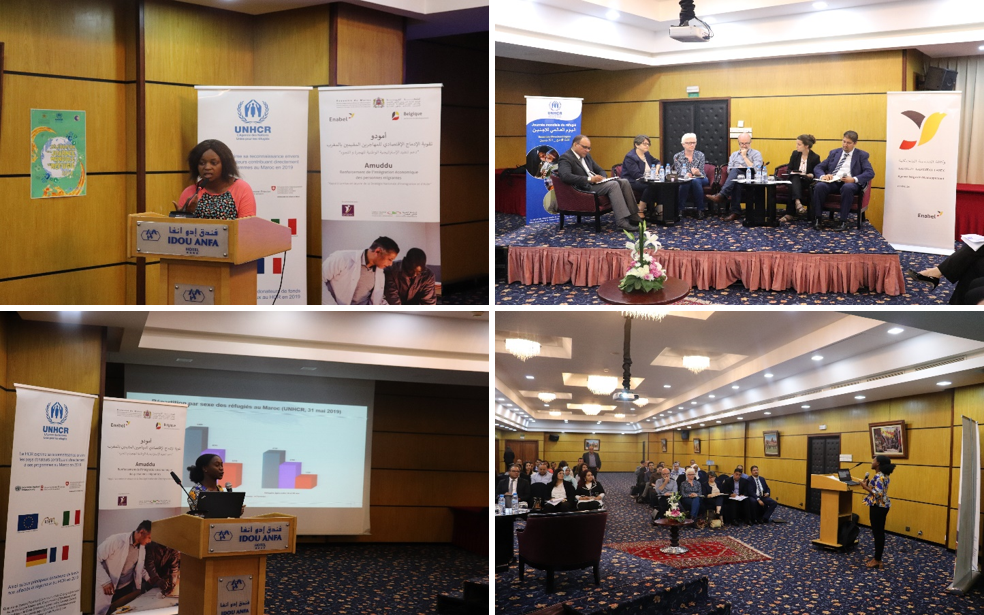
Les défis pour l’auto-emploi des femmes réfugiées analysés à l’occasion de la Journée Mondiale du Réfugié.
Saïd SAHLI | 19/07/2019
« Lève-toi et bats-toi, pour garantir ton autonomie financière, et ne reste pas les mains croisées… », c’était le message à la fois fort et porteur d’espoir lancé par Fabienne, réfugiée ivoirienne au Maroc depuis 2009, à toute femme réfugiée. Le témoignage poignant et émouvant de cette jeune femme a ouvert les discussions sur les défis et les opportunités de l’auto-emploi des femmes réfugiées qui ont eu lieu lors de l’atelier de réflexion organisé, à l’occasion de la célébration de la Journée Mondiale du Réfugié, par Enabel de concert avec ses partenaires, le Ministère délégué chargé des Marocains Résidant à l’Etranger et des Affaires de la Migration (MDCMREAM) et le Haut-Commissariat des Nations unies pour les réfugiés (UNCHCR), à Casablanca le 19 juin 2019.L’auto-emploi représente une opportunité d’intégration économique pour les personnes réfugiées au Maroc, et notamment pour les femmes. Cependant, la réalité -confirmée également par diverses études-, montre qu’il y a encore des obstacles qui entravent la mise en œuvre de ce type d’initiatives, notamment, l’accès au financement et l’accompagnement dans le parcours entrepreneurial. En effet, selon les données du UNHCR, la représentativité des femmes parmi les porteurs de projet réfugiés au Maroc est minime et décroit d’année en année alors que le nombre de femmes réfugiées a considérablement augmenté entre 2014 et 2018. La rencontre, organisée dans le cadre du projet « Amuddu : Appui à la mise en œuvre de la Stratégie Nationale d’Immigration et d’Asile – SNIA », a permis d’échanger entre les principaux acteurs intervenant dans la thématique de l’intégration économique des personnes migrantes et des réfugiées au Maroc et d’identifier des recommandations pour mieux accompagner les efforts des femmes réfugiées souhaitant entreprendre. Les réflexions ont mis l’accent notamment sur le besoin de mieux connaitre, à travers la réalisation d’études et de diagnostiques, les profiles des femmes réfugiées, ainsi que d’identifier les meilleurs créneaux et domaines d’activités porteurs vers lesquels les femmes réfugiées pourraient être orientées pour la création de leurs auto-entreprises. Il est également important de valoriser les compétences de base des femmes réfugiées qui peuvent être à l’origine de projets réussis d’auto-entrepreneuriat. Cela implique de renforcer les capacités des conseillers d’entreprises pour bien aider les femmes réfugiées à identifier les bonnes idées de projets et d’accorder davantage d’importance aux processus d’accompagnement pré et post création de ces personnes. Pour cela, les participants ont insisté également sur la nécessité de renforcer les partenariats dans la promotion de l’entrepreneuriat des femmes réfugiées. Cela pourrait revêtir plusieurs formes, par exemple, à travers de projets communs ; la définition de synergies et de complémentarités des services offerts ; des actions d’échange d’information régulière et des dynamiques de référencement des réfugiées souhaitant d’entreprendre ; ainsi que l’organisation des initiatives de formation réciproque entre les différents acteurs. L’encouragement des initiatives d’expérimentation de nouveaux dispositifs d’accompagnement et de financement reste une devise sûre qui devrait être capitalisée puis partagée avec les acteurs concernés par cette thématique. In fine, l’importance de faire connaitre des cas de réussite a été soulevé. Il est important de communiquer sur les « success stories » des femmes qui ont réussi leurs projets afin de devenir sources d’inspiration et de motivation pour d’autres femmes.
-
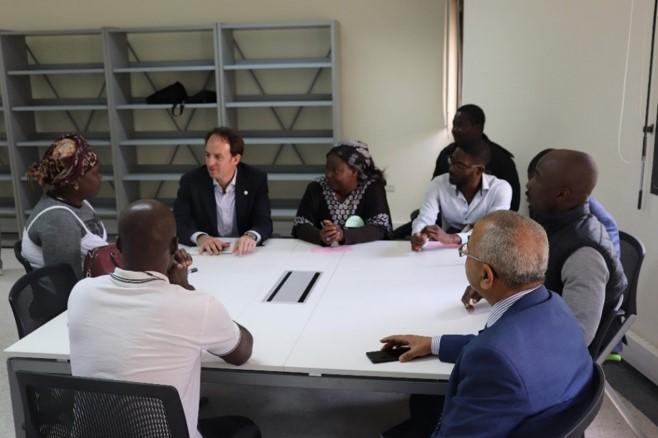
Jean Van Wetter, Directeur Général d’Enabel, visite des initiatives visant à promouvoir l’intégration économique des personnes migrantes.
Saïd SAHLI | 19/07/2019
Lors de sa visite au Maroc, le Directeur général d’Enabel, Jean Van Wetter, a eu l’occasion de connaitre le travail de proximité réalisé par le service public d’emploi, l'Agence nationale de promotion de l'emploi et des compétences (ANAPEC), et l’institution publique d’assistance sociale, l’Entraide Nationale, visant l’intégration économique des personnes migrantes au Maroc. Ensemble avec le Ministère délégué chargé des Marocaines résidant à l’étranger et des affaires de la Migration, ces deux institutions sont les partenaires principaux du projet Amuddu : Appui à la mise en œuvre de la Stratégie Nationale d’Immigration et d’Asile. Ainsi, le 3 mai 2019, deux visites ont été organisées consécutivement au Centre de Formation par Apprentissage de l’Entraide Nationale et au Centre Multiservices de l’ANAPEC, situés au quartier Akkari à Rabat, et ce pour s’enquérir in situ de l’offre de service orientée vers les migrant.e.s. Outre l’objectif principal de s’informer sur l’offre de service proposée aux migrant.e.s par les centres ciblés par le projet « Amuddu », aussi bien par l’accompagnement dans la formation professionnelle qu’à travers l’information en vue de leur insertion dans le marché de l’emploi et l’auto-emploi, ces visites ont permis entre autres de rencontrer in situ les migrant.e.s dans le contexte réel de formation et d’information, ainsi que les responsables des centres, les professeur.e.s de la formation professionnelle de l’Entraide Nationale et des conseillères de l’ANAPEC. A travers les échanges et les discussions effectuées avec l’ensemble des personnes qui ont pris part à ces deux activités, le DG d’Enabel a été informé, d’un côté, sur les différentes filières de formation professionnelle dispensées, ainsi que le mode de fonctionnement de la formation par alternance et, d’un autre, sur le processus d’accompagnement à l’emploi et l’auto-emploi mis en place par l’ANAPEC. Par la même occasion, il a eu l’opportunité de rencontrer les partenaires et l’équipe Enabel travaillant sur le domaine de la migration et de mieux connaitre les défis et les résultats des différentes interventions du portefeuille migration d’Enabel au Maroc.
-
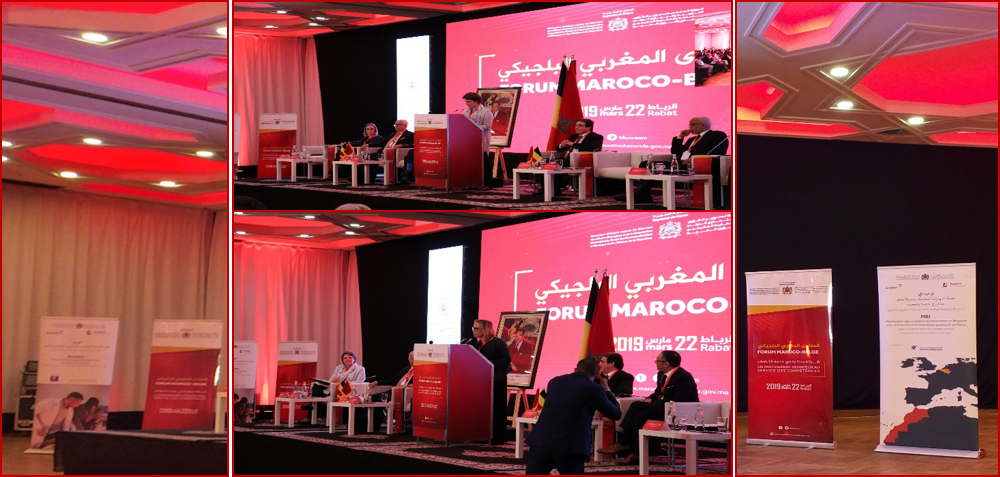
Le « Programme d’appui à la gestion de la thématique migratoire », exemple de partenariat novateur entre le Maroc et la Belgique
Saïd SAHLI | 19/07/2019
Le « Programme d’appui à la gestion de la thématique migratoire » a été présenté en présence d’une centaine de personnes d’origine marocaine résidant en Belgique lors du Forum maroco-belge : Un partenariat novateur au service des compétences, organisé le 22 mars à Rabat. La rencontre, organisée par le Ministère délégué auprès du Ministre des Affaires Etrangères et de la Coopération Internationale Chargé des Marocains Résidant à l’Etranger et des Affaires de la Migration (MDCMREAM) en concertation avec l’Ambassade de Belgique et Enabel au Maroc, visait à examiner avec tous les partenaires les voies et moyens de renforcer la mobilisation des compétences marocaines en Belgique pour participer au développement économique, social et culturel des deux pays. En plus de nombreuses compétence marocaines résidant en Belgique, le forum a été marqué par la participation du Ministre Chargé des Marocains Résidant à l’Etranger et des Affaires de la Migration, M. Benoutiq ; le Ministre de l’Emploi et de l’Insertion Professionnelle, M. Yatim ; le Ministre Francophone de la Jeunesse, de l’Aide à la jeunesse, des Maisons de justice, des Sports et de la Promotion de Bruxelles, M. Madrane ; ainsi que le Secrétaire Général du Ministère de la Solidarité, de la Famille, de l’Egalité et du Développement Social, M. Tabit. Le panel de la séance d’ouverture comptait également S.E.M. l’Ambassadeur du Maroc en Belgique, M. Ameur ; l’Ambassadeur, Expert à Policy Center for the New South, M. Loulichki et des représentants de l’Ambassade de Belgique au Maroc et de l’Agence belge de développement « Enabel » au Maroc. Lors du forum, le « Programme d’appui à la gestion de la thématique migratoire », mis en œuvre par Enabel en partenariat avec le Ministère Chargé des Marocains Résidant à l’Etranger et des Affaires de la Migration et financé par la Belgique, a été présenté comme un exemple de partenariat novateur entre les deux pays. Il est composé de deux interventions : le projet « Maghrib Belgium Impulse : appui à la mise en œuvre de la Stratégie Nationale en faveur des MRE », qui a pour objectif de mobiliser et d’accompagner les Marocains résidant en Belgique pour entreprendre au Maroc, en partenariat avec la Confédération Générale des Entreprises du Maroc (CGEM) ; et le projet « Amuddu : appui à la mise en œuvre de la Stratégie Nationale d’Immigration et d’Asile », dont le but est d’améliorer l’employabilité des personnes migrantes au Maroc, en collaboration avec l’Entraide Nationale et l'Agence Nationale de Promotion de l'Emploi et des Compétences (ANAPEC).La coopération maroco-belgeLa rencontre s’est structurée sur trois axes de travail qui montrent la richesse de la coopération maroco-belge : les relations de partenariat entre les deux pays, l’entreprenariat au service du développement et la culture comme levier du vivre ensemble. Les échanges entre les intervenants et les participants ont permis d’identifier plusieurs initiatives intéressantes visant à renforcer la mobilisation des compétences marocaines en Belgique pour contribuer au développement des deux pays. Parmi d’autres conclusions, les intervenants ont convenu que la coopération maroco-belge est novatrice dans le sens où :elle associe le partenariat à la culture -qu’elle considère comme vecteur de développement;elle met l’accent sur la jeunesse -qu’elle considère comme potentiel de créativité- ;et elle promeut l’économie sociale et solidaire, l’économie verte et le développement durable en général. En outre, cette coopération -qui peut être caractérisée par trois attributs : réalisme, pragmatisme et dialogue- est amenée à continuer au niveau opérationnel à travers la réalisation des deux interventions portées conjointement par le MDCMREAM et Enabel et qui ont été présentées lors du forum : le projet Maghrib Belgium Impulse et le projet Amuddu.L’importance de consolider les liens de ces MRE avec leur pays d’origine, de promouvoir les opportunités d’investissement productif au Maroc et en Belgique, de renforcer le rapprochement entre les entreprises belgo-marocaines et le tissu productif dans les deux pays afin de créer des synergies autour de projets innovants a été également souligné. In fine, un accent particulier a porté sur le volet culturel, vu par les participants comme un vecteur de créativité et d’innovation qui permet de relever les défis du développement durable, encourager la croissance économique et promouvoir l’inclusion sociale.
-
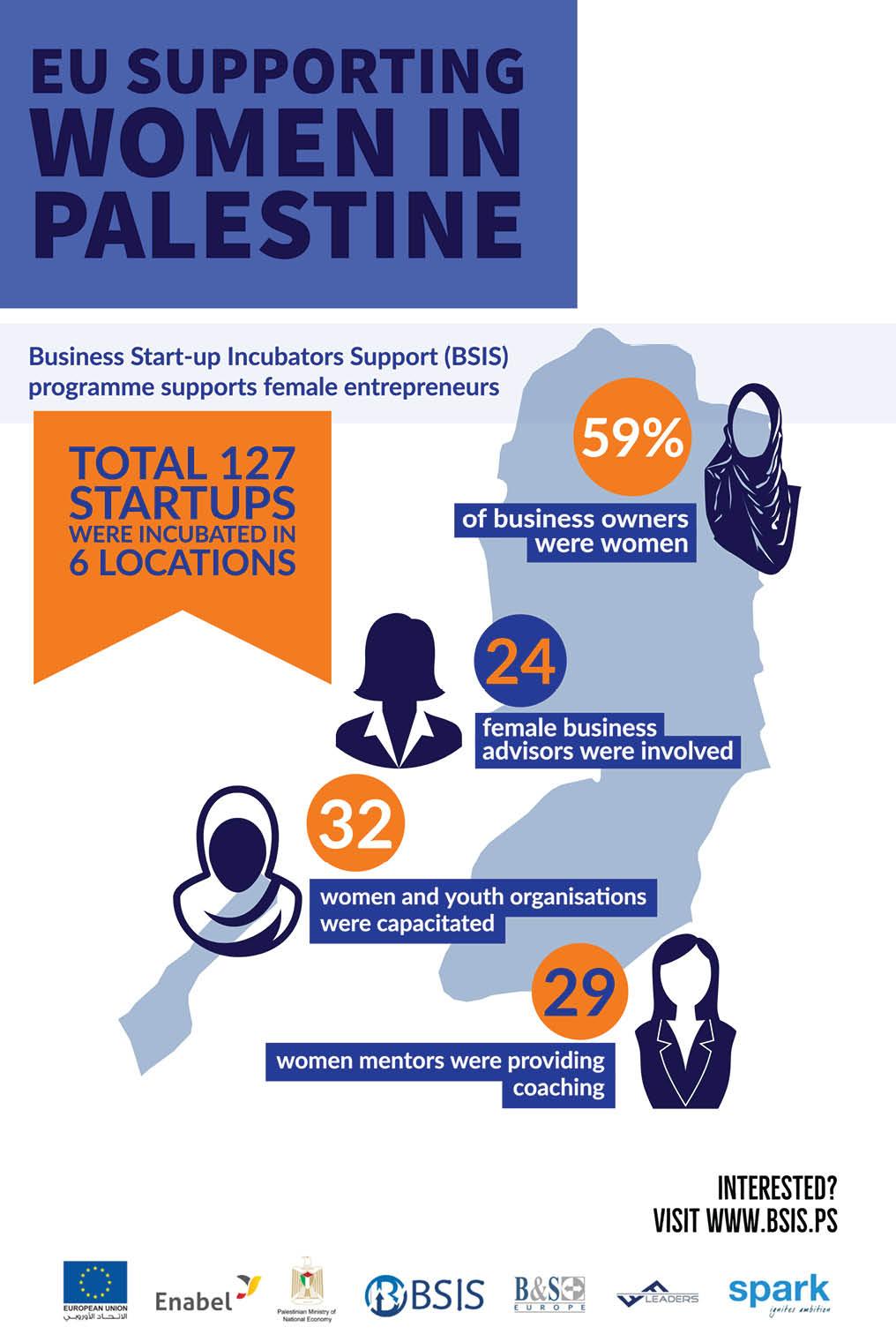
Passion and Hope - Palestinian Women Entrepreneurs
Roula HANDAL | 02/07/2019
Article by:Anu VirtanenIn 2004, entrepreneurship and start-up support programs in Palestine began by targeting the students at universities, particularly those in the IT sector. The first programs focused on promoting the idea of entrepreneurship and encouraging Palestinians to take this path. IT centers of excellence began to incubate start-ups through provision of space and guidance. Later on, while the start-up ecosystem developed, the incubators started to provide the entire cycle of incubation, including systematic advisory services and coaching, as well as business advice. Moreover, the business incubators began to be more open and encouraging to other business sectors outside the arena of IT. This probably plays a role in the decisions of many women to translate their ideas into businesses and join the incubators. Albeit men are still way more likely than women to become entrepreneurs, the number of female entrepreneurs is growing, particularly in Palestine. According to a World Bank study*1 published last year, 23 percent of start-ups in Gaza and the West Bank have female founders, while in similar ecosystems the numbers are lower – in Beirut, for instance, 19 percent of the start-up entrepreneurs are women and in Dar es Salaam, 15 percent. *2 Let’s ask Palestinian women why they chose the path of starting their own business. Laughter yoga ambassador runs growing business without stress While working for several years in the field of women’s empowerment in the MENA region, Palestinian Dr. Manal Dandis from Hebron heard countless stories of women who were under stress. The working environment slowly began to have a negative effect on Dr. Dandis as well. She recalls how she found laughter yoga: “I was searching online for a method to reduce stress, and laughter yoga attracted my attention. I read about the benefits: the yoga breathing sequence combined with laughter brings oxygen to one’s body and releases stress. According to the studies, fake laughter provides the same physiological and psychological benefits as spontaneous laughter. I started to practice it and felt the benefits immediately.” When Dr. Dandis wanted to share her experience with others suffering from stress, she found out that there were no laughter yoga teachers in Palestine. So she decided to become one herself and packed her luggage in order to travel to India to study with Dr. Madan Kataria, the originator of the concept. Dr. Dandis is now a certified laughter-yoga teacher and the official laughter-yoga ambassador to the Middle East. She gives classes in gyms, sport clubs, study centers, chambers of commerce, and children’s centers. While targeting mainly the most vulnerable people, such as disabled children and families living in poverty, she also teaches in work teams and school classes. She has so much work that she is able to employ yoga teachers and grow her business. For this she is receiving support from the EU funded Business Start-up Incubator Support (BSIS) project, implemented by Enabel (the Belgian development agency) at the Business Incubator Unit of the Palestine Polytechnic University in Hebron.Dr. Dandis’ business idea follows the mission of the laughter-yoga concept: health, happiness, and world peace. She believes in these values, and she is convinced that given the great market potential, her business will continue to grow. “I have already overcome many obstacles. By showing the scientific research that has been carried out on laughter yoga, I have convinced people that it is neither a religious nor a political endeavor. It is a method to release stress, and this is what we need. My dream is that all Palestinians would practice laughter yoga,” she concludes while laughing.A passion for fashion resulted in a career changeFashion designer Manar El-Banna presents sketches and photos of dresses that are ready for purchase in her showroom in Gaza City. It’s difficult to believe that she only started her career as a fashion designer about five years ago. “I studied architecture, which obviously requires some similar skills, but fashion was only a hobby for me before. I sewed baby clothes for 12 years until I started to think that it could be my main job,” she reveals.“I receive professional support on how to teach laughter yoga from my mentor, Dr. Kataria, and the BSIS program facilitates the technical aspects of the management of my business. Moreover, I enjoy the positive energy around me in the office where I meet other start-up entrepreneurs, create new ideas, and seek for synergies.”Dr. Manal DandisEl-Banna changed her career and followed her passion by establishing Mix Fashion in 2013. Since then, she and her growing number of staff members have been designing and sewing multi-usage dresses, some of which are made from recycled materials. Due to the restrictions imposed on imported goods, textiles are costly in Gaza. Therefore, many women prefer to own multi-usage clothes or recycle their old clothes.“I started with abayas and continued making wedding dresses and other costumes with the idea that the customer could wear the same attire on several occasions. Regardless of the purpose, all my clothes are tailor-made,” the designer explains. While pleasing customers is an obvious goal of every business owner, under the difficult situation that Gaza is facing, the social impact of entrepreneurship is equally important for El-Banna. Her business contributes to improving the lives of several Gazan families since Mixed Fashion employs five full-time employees along with several part-time workers. Employing women requires taking cultural aspects in to consideration. She explains: “Some of my part-time employees work from home, which allows these women to continue to take care of their families while they earn some extra income at the same time.”El-Banna’s passion and vision led her to choose a career in fashion design, but in order to make her business successful she needed professional business advice. “The biggest advantage of joining the Business and Tech Incubator at the Islamic University of Gaza is that it enabled me to move from my old office to the showroom here in the center of Gaza City. The seed fund I received made this possible,” notes El-Banna.The designer says that they call the BSIS program bassees, which means “hope” in Arabic. “Hope is what the project and entrepreneurship have given me,” El-Banna concludes.Satisfaction through entrepreneurshipJerusalemite Suzan Ghosheh Shurafa has done something unusual with her life. She used to hold a good position in an international organization, but she felt that her creativity and energy were restricted. She explains the reasons behind her decision: “As a psychotherapist, I needed to be in the field, not in the office waiting for a fund or a new project. I was sitting in meetings, writing papers, and doing deskwork while I saw that there was a lot of work to do in the field.”Ghosheh Shurafa opened up to her friend Asmahan Alayan who is an experienced businesswoman who was dealing with start-ups. Encouraged by these discussions, Ghosheh Shurafa became convinced that she should start a business on her own. She partnered with Suad Mitwalli whom she met in a psychodrama high-diploma course. Previously both of them had completed a BA in psychology from Birzeit University. In addition, Mitwalli holds a diploma in Eye Movement Desensitization and Reprocessing Therapy. These two women, who have a lot of experience in counseling and trauma therapy, especially with women, decided to establish Nisma Al-Quds, which means “fresh air Jerusalem.”“My own business is my dream come true! I don’t want to sit at home; I want to do something I love.” Suzan Ghosheh Shurafa“We started to use nature as a therapeutic technique by organizing walks and talks in nature and breathing activities for women in the villages and raising awareness about mental health. We have traditionally labeled mental health as a concern only for those persons who have been marginalized because of their psychopathology. I have a passion to change this,” Ghosheh Shurafa states.She emphasizes that mental health issues do not occur only in the refugee camps or within other vulnerable groups but also among women who work and live regular lives in the cities. Since Nisma Al-Quds joined the Jerusalem business incubator, partnering with Palestine Education for Employment and operating on the premises of Al-Quds University, they started to strengthen their marketing and awareness-raising activities. In addition to traditional psychotherapy, they continue to introduce new therapy methods, such as group therapy and psychodrama.*1 Press Release, “New World Bank Report Highlights What It Takes to Build a Robust Palestinian Start-up Ecosystem,” The World Bank, July 2018, available at https://www.worldbank.org/en/news/press-release/2018/07/11/new-world-bank-report-highlights-what-it-takes-to-build-a-robust-palestinian-startup-ecosystem.*2 Tech Startup Ecosystem in West Bank and Gaza, Findings and Recommendations, The World Bank, 2018, available at http://documents.worldbank.org/curated/en/715581526049753145/pdf/126144-replacement-WBG-ecosystem-mapping-digital.pdf.Anu Virtanen is a Finnish communications consultant who works for several EU entities globally, including the EU-funded Business Start-up Incubators Support (BSIS) program, which supports entrepreneurs in Palestine through partnering with business incubators located in East Jerusalem, Ramallah, Hebron, Bethlehem, and Gaza. The program encourages entrepreneurs to change their ideas into businesses and, consequently, contributes to private-sector development and the improvement of lives in Palestine. The program is implemented by Enabel (the Belgian development agency).
-

VET Toolbox hackathon: after movie!
Thibaut MONNIER | 02/07/2019
On 23-24 May 2019 the VET Toolbox hosted a hackathon in Brussels. A two-day out-of-the-box event bringing together (un)usual suspects to tackle challenges on inclusion and public-private collaboration in vocational education and training.Want to know more? Visit www.vettoolbox.eu
-
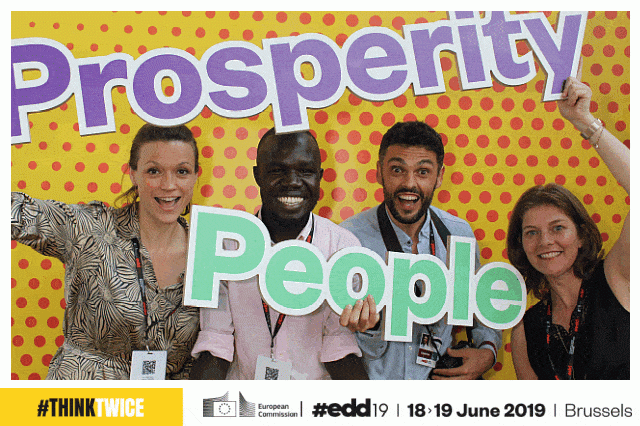
The VET Toolbox at the European Development Days 2019
Thibaut MONNIER | 02/07/2019
From 18 to 19 June 2019 the VET Toolbox had the pleasure of taking part in the 12th European Development Days (EDD) with the central theme: "Addressing inequalities: building a world which leaves no one behind”.For two days, the VET Toolbox team answered questions from many private and public sector stakeholders from around the world as well as from the Belgian Government and the European institutions. With the title "Relevant skills for all", the VET Toolbox stand discussed issues of inclusion of vulnerable groups in VET with participants and explored ways to develop effective and sustainable public-private partnerships to strengthen VET systems.The VET Toolbox stand had also the honor to receive the Belgian Minister of Development Cooperation Alexander De Croo, the Managing Director of the Belgian Development Agency -Enabel- Jean Van Wetter and, last but not least , the European Commissioner for Employment, Social Affairs, Skills and Labor Mobility, Marianne Thyssen who said "I strongly believe in the importance of VET - Vocational skills in combination with more all-round 'life skills' make a great future-proof match".Organised by the European Commission, the EDD bring the development community together each year to share ideas and experiences in ways that inspire new partnerships and innovative solutions to the world’s most pressing challenges.
-
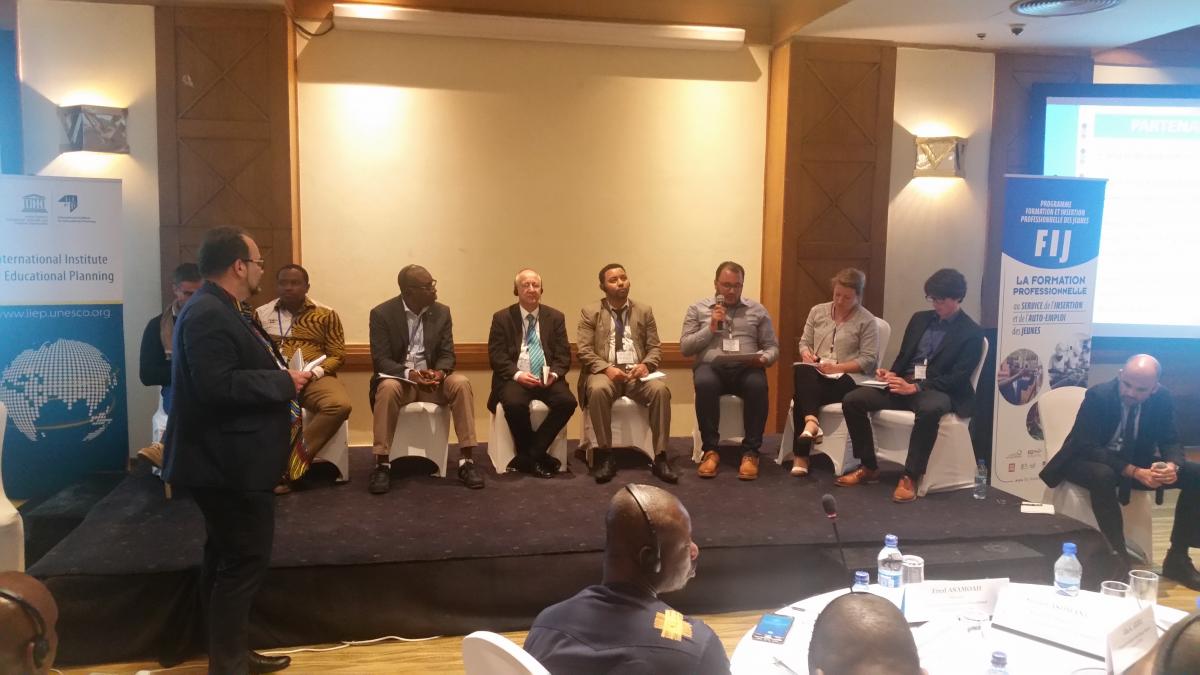
Regional workshop on VET systems for youth employability in Africa
Thibaut MONNIER | 02/07/2019
Around 140 stakeholders from 31 African countries composed by officials from public and private sectors (Min.Education, Chambers), next to directors of public/private Vocational training centers, participated in the second regional workshop organized by IIEP-Pôle de Dakar, LuxDev and IFEF in Nairobi on 18-20 June 2019, entitled “Improving quality management in TVET systems for the successful training-to-employment transition of Africa’s youth”.Important topics such as Public Private Partnerships, how to mobilize the private sector with CNQ, daily management of Vocational training centers, renewed apprenticeship, key performance indicators, job insertion, statistics and surveys were on the programme of this 3 days workshop and lead to recommendations which PEFOP, IFEF, LuxDev will take up from here.Following the success of the first Regional Workshop on Public-Private Partnerships in Vocational Training in Africa held in Dakar, March 2018, this second edition counted on the support of the European Commission's Support Facility the VET Toolbox. Besides, donor representation through AFD, UNESCO-UNEVOC, Enabel and GIZ were also presents and the Moroccan delegation exposed about the British Council support to their operational Public-private partnerships.
-
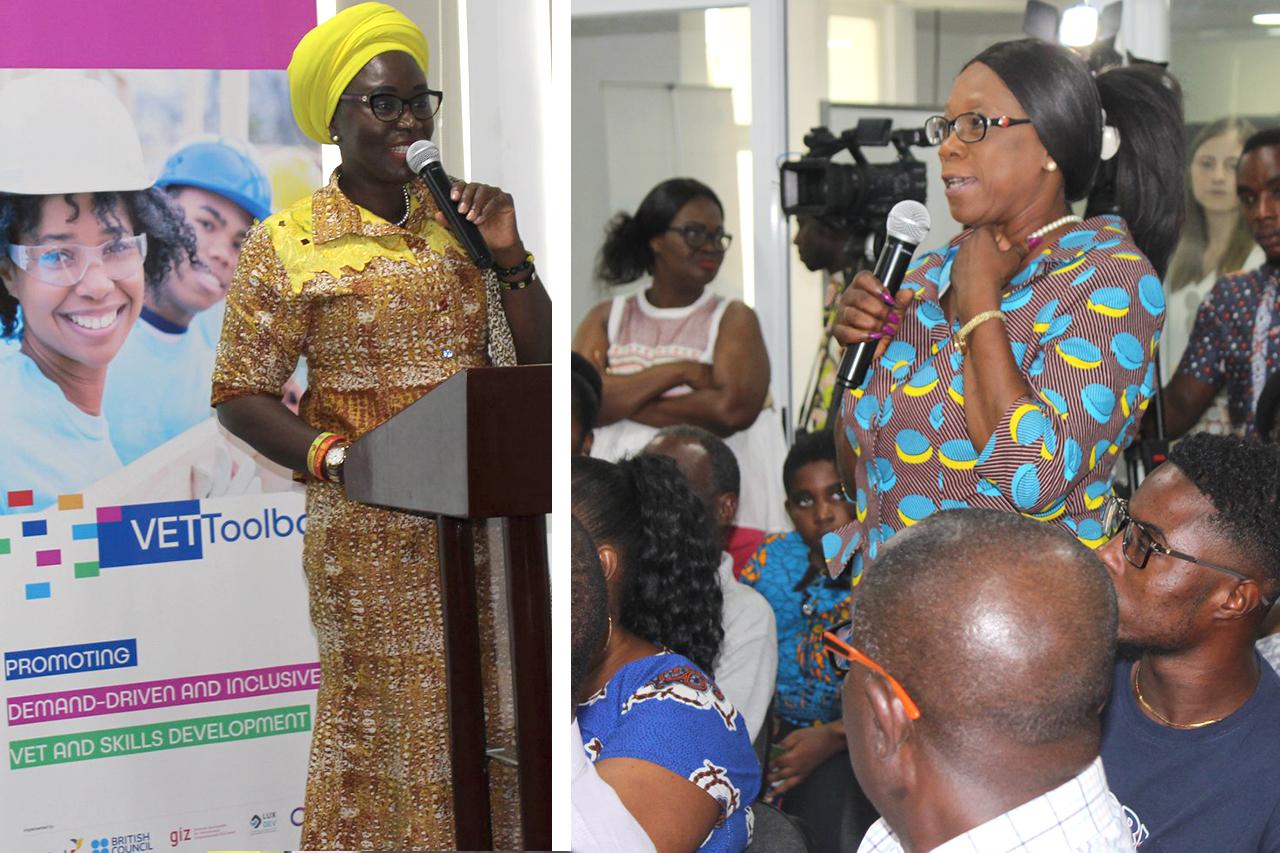
VET Toolbox joint workshop in Accra
Thibaut MONNIER | 02/07/2019
The British Council and Deutsche Gesellschaft für Internationale Zusammenarbeit (GIZ) GmbH jointly working with the Fair River International Association for Development (FARIAD) and the National Vocational Training Institute (NVTI) have successfully completed another EU VET Toolbox Project in Ghana.The project supported FARIAD, a Ghanaian NGO and private TVET provider, and NVTI to develop stronger VET and industry partnerships, provided skills to develop workplace relevant curriculum and offered training in Career Guidance and Counselling based on FARIAD’s support request.The short-term project was funded under the Vocational Education and Training (VET) Toolbox Project, an EU- and BMZ-financed technical cooperation facility set up to promote demand driven Technical Vocational Education and Training (TVET).Using three short-term specialists, initial consultations led to tailored training programmes being delivered in each of the three areas, VET & Industry PPPs, Curriculum Development as well as Career Guidance and Counselling. The training will assist VET providers to make the skills of their students more relevant to labour market needs, which will ideally lead to increased job opportunities for youth and improved enterprise productivity.On Friday, 12th April 2019, a VET Toolbox briefing workshop at British Council was held to discuss project activities and reflect on findings from the consultations and interventions. It showcased the work of Toolbox more broadly and provided advice on how other organisations in Ghana might benefit from the support Toolbox offers.The Vocational Education and Training (VET) Toolbox Project has been launched in Ghana in September 2018 as one of the first countries to participate in this project with a call by Mr. Robin Cordes, Deputy Head of Development Cooperation, Embassy of the Federal Republic of Germany, for renewed partnership to curb youth unemployment. The initiative is co-funded by the European Union and the German Federal Ministry for Economic Cooperation and Development (BMZ) and implemented through a partnership of European agencies namely British Council, GIZ, Enabel and LuxDev. The project operates mainly in African and Asian countries.According to requests from partner countries the project fields short-term experts to support industry led VET solutions. Public and private institutions working on VET and employment promotion from Ghana can electronically submit a request for support to the VET Toolbox. The VET Toolbox Coordination Hub assesses the request and, if the request is eligible, defines the support intervention in dialogue with the requesting institution. Then the short-term expertise is selected and fielded to work with the requesting institution/s in Ghana.To date, the VET Toolbox has received four support requests in Ghana. The request from the National Board for Professional and Technician Examinations (NABPTEX) was already completed in September 2018; further requests were received from the Council for Technical and Vocational Education and Training (COTVET), the National Vocational Training Institute (NVTI) and FARIAD.
